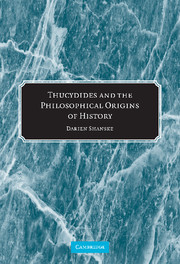Book contents
- Frontmatter
- Contents
- Acknowledgments
- Introduction
- 1 Thucydides's Vision
- 2 The Case of Pericles
- 3 Deinon, Logos, and the Tragic Question Concerning the Human
- 4 Thucydidean Temporality
- Appendix I Restoring Key Terms 1.1–1.23
- Appendix II Pretragic History of Deinon
- Appendix III Wittgenstein on Fly-Bottles, Aspect Seeing, and History
- Appendix IV Heidegger on World and Originary Temporality
- Notes
- Bibliography
- Index
4 - Thucydidean Temporality
Published online by Cambridge University Press: 19 August 2009
- Frontmatter
- Contents
- Acknowledgments
- Introduction
- 1 Thucydides's Vision
- 2 The Case of Pericles
- 3 Deinon, Logos, and the Tragic Question Concerning the Human
- 4 Thucydidean Temporality
- Appendix I Restoring Key Terms 1.1–1.23
- Appendix II Pretragic History of Deinon
- Appendix III Wittgenstein on Fly-Bottles, Aspect Seeing, and History
- Appendix IV Heidegger on World and Originary Temporality
- Notes
- Bibliography
- Index
Summary
Introduction
It has now been demonstrated that Thucydides's text shares many features with tragedy and that a key feature that is shared also explains why tragedy is not just one genre among many from which Thucydides draws. Rather, the deinon, as demonstrated in tragedy, is precisely that feature of the world that demands to expand beyond the tragic stage and into the world of the polis, just as Hegel's interpretation of the essence of tragedy suggested that it must. The functioning of the deinon in Thucydides also justifies our appeal to tragic temporality as structuring the world that Thucydides discloses. We have seen some examples of this tragic temporality, as in the plight of the Thebans at Plataea or of the Athenians in connection with the story of Harmodius and Aristogeiton. In this chapter we will develop other examples and deepen what is meant by tragic temporality. Tragic temporality is the answer to the question of why Thucydides's text founds a world rather than merely discloses one. This is to say that we have seen in Chapters 1 and 2 that Thucydides self-consciously discloses a world, and Chapter 3 justifies our description of this world as “tragic.” Yet returning to the Introduction, our task is to explain the extraordinary success of this text in founding a world.
It is standard to claim that Thucydides's continued celebrity has to do with the “timelessness” of his work, and one often hears similar comments about tragedies, like Oedipus Rex.
- Type
- Chapter
- Information
- Thucydides and the Philosophical Origins of History , pp. 119 - 154Publisher: Cambridge University PressPrint publication year: 2006

